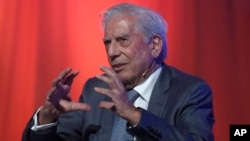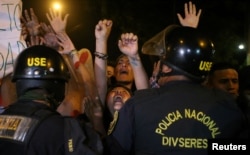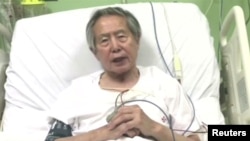A group of more than 230 Peruvian writers, including a Nobel laureate, has signed a letter rejecting the pardon of former President Alberto Fujimori.
Nobel prize winner Mario Vargas Llosa, along with celebrated authors Alfredo Bryce Echenique and Fernando Iwasaki, spoke out in the letter, criticizing President Pedro Pablo Kuczynski for his Christmas Eve announcement.
In issuing the pardon for his predecessor, Kuczynski said the decision was made on humanitarian grounds because Fujimori, who was serving a 25-year prison sentence, has been in poor health.
The letter says Fujimori “was responsible for a coup d’etat as well as the dismantling of our institutions, and his pardon demonstrates a lack of appreciation for dignity, equality before the law, and the right to remember wrongdoing.”
It calls the pardon “a treacherous covenant between political forces interested in controlling the effects of corruption cases they are involved in, as well as perpetuating the injustice and impunity.”
Pardon sparks protests
Vargas Llosa also wrote a column in El Pais newspaper saying those, including himself, who had voted for Kuczynski in good faith that there would be no pardon for Fujimori had unwittingly contributed to giving Fujimori back his power. He said the pardon makes Kuczynski an “accomplice and hostage” of Fujimori, who was convicted of human rights violations, corruption, and the sanctioning of death squads during his time in office from 1990 to 2000.
Fujimori is admired by some Peruvians for combating Maoist rebels, but others consider him a corrupt dictator.
The pardon has sparked protests in Lima, the Peruvian capital. On Dec. 24, police fired tear gas at scores of Fujimori opponents as they waved pictures of the victims of a counterinsurgency campaign during his right-wing government.
A request for forgiveness
Two days later, Fujimori asked the public for forgiveness.
In a Facebook video filmed from his hospital bed, Fujimori, 79, said, “I am aware that the results of my government were well received on one side, but I admit that I have let down other compatriots, and I ask them to forgive me with all my heart.”
Fujimori thanked Kuczynski for the pardon and said that as a free man, he would support the president’s calls for reconciliation in the Andean country.
Fujimori was taken to the hospital Dec. 23 after suffering a severe drop in blood pressure and an irregular heartbeat. His doctor, Alejandro Aguinaga, denies allegations it was a ruse to legitimize the pardon.


